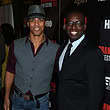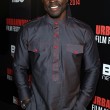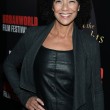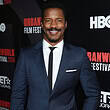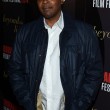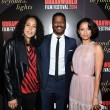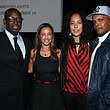Director Malcolm D. Lee, moderated an amazing panel after the US premiere of “Beyond The Lights” on the opening night of the Urban World Film Festival presented by BET and HBO.
Stars Gugu Mbatha-Raw and Nate Parker, Producers Stephanie Allain, Amar’e Stoudemire and Reggie Rock Bythewood, Writer/Director Gina Prince-Bythewood and editor Terilyn A. Shropshire participated in a no-holds-barred conversation about the film at SVA for almost an hour. Below are highlights from the conversation, which has been condensed and edited.
Why tell this story? Why were you so passionate about this story?
Gina: It all started with what I wanted to do next after “Secret Life Of Bees” and I decided I wanted to do a love story again. It’s been fourteen years since “Love & Basketball.” I wanted to get back into the genre, but I also wanted to do a music film and some of my favorite movies are music films. So it was really about putting those two things together and then finding a story that could fit in that. It was really two things that happened: one is that as this idea was coming to me when I went to an Alicia Keys concert at the Hollywood Bowl, and in the middle of the concert she started singing the song “Diary” and that was just an amazing experience as a writer to suddenly have this character’s story come into head and it was like I was watching a movie while she was singing, and the second part of it was at that same time I was dealing with some personal issues in terms of being adopted and tracking down my birth mother – just finding out the circumstances of my birth, which was not cool. And just really when meeting her realizing “wow, if she had kept me, what my life would’ve been like, to be raised by someone who both loved and hated you at the same time and resented you.” I thought that that was an interesting thing for a character, someone who grew up without unconditional love and which should really be the right of every kid and that was really the foundation for the Macy/Noni relationship.
It’s one thing to watch a movie and it’s another to experience the movie. I felt the movie. How were you able to achieve that?
Gina: Two things. One, it starts with the script. For me, writing the script took a couple of years and 55 drafts is up on that screen. It was just trying to hone it and hone it and hone and give it to the crew and really working with Reggie, my husband, and a brilliant writer. Really just working it and working it. He would not let it out until it was right and so it starts there. Again, casting is everything and I was blessed with a phenomenal cast that came together and these two [Gugu and Nate] so believed in the vision and their characters and embodied those characters fully and protected the characters as well, I think it shows up on screen.
Gugu, you came off as any pop singer whose out today – Rihanna, Beyonce, Nicki Minaj. You just capture that character. What drew you to the project and what was the preparation?
Gugu: I think when I first read the script, I thought Gina had done such a phenomenal job in showing the underbelly of the music industry in terms of, yes we have all the gloss of that sort manufactured pop star image that we’re so familiar with, but it also shows the sort of psychological effects of fame and for me the idea of mental health and how if you don’t have a sense of self-worth, it really doesn’t matter if people are lauding you with all of these accolades. So for me, I thought that was really a worthwhile story and I felt like it was really up lifting. I felt like the love story was beautiful and fun, and that there was an intimacy and realness to it that I thought was really refreshing.
In terms of preparation, I think I first read a draft of “Blackbird” in about 2011 and I auditioned for the role a couple of times and then Gina was just kind of prolific in supplying me with reference materials, in terms of not just watching music videos of contemporary artists, but also directing to stars of yesteryear, like Marilyn Monroe and Judy Garland and reading their biographies and seeing this potentially toxic mother-daughter dynamic and these young girls being groomed into an over-sexualized identity in the industry has been going on for quite a long time. So there was that and we spent a lot of time together, and we went to a lot of concerts, we went to the Grammys, we saw Rihanna and Beyonce. I also had to watch all these films like with Bette Midler in “The Rose” and “Lady Sings the Blues” and “Purple Rain”. I mean we really saturated ourselves in movies from “Purple Rain” to “Walk the Line”. Things that weren’t necessarily correlating with this genre.
And also then there was the dancing and singing training, I worked quite rigorously with an amazing choreographer called Laurieann Gibson, she really put me through my paces, hours of sweating in the dance studio. And I’ve worked with an amazing vocal coach called Debra Byrd and I had my first music experience working with The-Dream and his amazing team. So it was kind of a whole mixture of stuff, and then working with Nate. Gina brought Nate in quite early in the rehearsal process and we had the opportunity to do some improvisation.
Nate, phenomenal performance. What drew you to the project and what was your preparation?
Nate: First, it starts with Gina. I think as an actor or artist, you want to trust the people that are directing you. It’s so important and I always told Gina, she has a green light, a direct line, and I said “if you have something I might be good for you don’t have to go through agents or anything, just call me and I’m in.” So that’s how it started. I knew it would have integrity, I knew it would have a message, so it made it very easy for me to be involved. Actually, I was working with Gugu early on before I was attached to the project. Gina did a couple of things and she asked me if I would come help out and I responded to the material and I just came to help. Gina tells you to show up, you show up.
A lot of people when they watch a film, wonder how much was improvised I think it’s important to note that so much was on the page and she wrote it all. We weren’t making stuff up, she was very intentional in the direction she wanted it go and because it was so deep and so thought provoking, it just made it easy to slip in. And the chemistry, all of those things were the product of her genius. One of the things she did to us – she set us up, she called me one day and said, “I want you to go to lunch and be in character.” So I said cool she wants us to be in character and we get there not knowing what to expect. And Gugu won’t take her glasses off … and all of a sudden people start coming up and start taking pictures. First it was like one or two people and then it was like ten people, and then 15, I was like where are these people coming from? The people in the restaurant didn’t know what was going on, they didn’t know what we were doing. So we go outside and all of a sudden there were like 50 people on motorcycles – there were SUVs, they were blocking us off – it was the most insane experience I have ever had. So here I had to protect her, and I had to deal with these people and they were so disrespectful … but there was a bond and we made it through. I remember driving back together saying it was amazing experience and we never could have prepared outside of her putting that together, so it was a lot of those things. She was very very prepared in what she does. A lot of people ask why it takes her so long, and it’s because she wants to get it right the first time. All of her films are ones that we love, and I honor her for that – for taking that kind of time and doing it right.
This film not only took a while to write, but took a while to get on screen. Stephanie Allain, could you talk about how the movie came to finally be on the screen?
Stephanie: Sure. Well first of all, Gina had written an amazing script. Gugu was already cast, they’d already shot an eight-minute trailer, basically a couple scenes from the movie. It was fantastic. My job was really really easy. I just picked up the phone and called everybody and said “Oh my god, this is such a great movie. Who wants to make it?” That’s pretty much how it went down. And Reggie brought BET in early on, they backed the movie, they loved the movie. And having their confidence behind us, we all brought it to Relativity. And the folks at Relativity, we had one meeting. It was one meeting, we sat at a table, with Matt and Tucker and Robbie, and Happy and Josh, and they said they wanted to make the movie. And they did, and that’s pretty rare in this town.
Kudos to Relativity. Mr. Amar’e Stoudemire how did you get involved in the project?
Amar’e: I work hand in hand with Relativity. It’s a company that I work with. When they called me about this film, I read the script and then once I read the script and realized it was going to be a very very inspirational film. Once I came to that conclusion, I flew into L.A to be on set, and I saw operations working and I thought this is something that I really want to be involved in. So that’s how I got involved.
Gina, I noticed that many of the key crew are women.
Gina: Oh yeah!
From writer, director, DP, editor, etc. Was that a conscious decision? To have women in key positions?
Gina: Well, foremost it’s about the more films that you do, the more people you meet and want to work with. I have such an amazing group of people around me, that happen to be women, and to get Teri, (this is the third movie we’ve done together) as Editor, I’ve worked with Tammy [the DP]. There is a different energy on set when there is more women. A different vibe and given the nature of the film, it was very important to me to surround the actors as well with a very maternal environment.
Gugu you worked with Gina, Amma Asante, and male directors. How is that? Is it different? The same?
Gugu: I think it’s definitely case by case. For me, in film I’ve actually worked with more female directors than men directors. So, for me, I guess what has been amazing is that most recently the two female directors that I have worked with, they are lead roles … but actually the characters are that much more layered. And I think that, for me, in the script – talking about Amma Asante who is wonderful and talented and Gina, too. They are different people and have different styles but for me, what united them is that they are able to bring these multi-faceted roles and the women drive the story and they are not just an adornment. They really have a complex inner life. And that is one of the most exciting experiences that I’ve had working.
Reggie, you’re not only a producer on this movie, but you are married to the director. Now, without getting into a fight later on, how are you able to do that? Two people who are equally talented, equally driven in this industry, how do you guys make that work, with raising children as well?
Reggie: Well one of the first things we said was we gotta get somebody else in here, so we called Stephanie Allain. And in many ways that was important because, when you are making a film, it’s like this weird zone you get into where it takes the focal point, where it feels like nothing else is going on in the world, everything is revolving around this film. But when you are married, and you have kids, you know sometimes the biggest thing that happened in your life that day was that somebody hurt your kid’s feelings. In the way Gina is, she does not want to be on set and not know what happened with one of our kids. So really, sometimes we were on set, talking about something, the process or overseeing on set, sometimes we’re talking about the kids and how they did on tests. So, I have to tell you honestly, I just really think it is something we are still figuring out. It really is an interesting juggling act, and I don’t think we’ve nailed it. I think it’s part of our maturity. Sometimes we feel like we nailed it and then the next day we are like, nah we didn’t.
Hair is important to the film. The visceral response the audience had to pulling out her weave and embracing her natural hair, what were you trying say? What are the politics of hair?
Gina: Honestly, it started because I was adopted by white parents, amazing people, did not know what to do with my hair, at all. So I grew up as a little girl looking like that girl on screen. And I just grew up hating my hair, and the way I looked and it wasn’t until getting into college and coming into my own that I was able to embrace myself. So it’s not so much the hair, it’s more so this character Noni, being comfortable enough in her own skin, to shed this whole facade that she and her mother created, to cover up who she really is. One of those things was her hair and going with what seems to be thought of being beautiful, long hair. So it was really more about that.
Gugu, it’s a very raw, vulnerable, naked performance. That takes a lot of guts and trust. How were you able to get there?
Gugu: I trusted Gina. I think that you have to start with trusting the director. Particularly because this film deals with the idea of not just identity, but also ego and persona and all of that stuff the character is dealing with. For me because we had a long gestation period with the film and spent a lot of time together, talking about the character. I sort of think that’s really the only way. You gotta leap in and trust the people you are working with.
Gina: The trust goes both ways, between the director and actors. With Gugu, the fact that I knew she had the chops to do it, coupled with that is an amazing work ethic. And to be able to trust her to put in the work that she would need to put in, and [she worked] literally four to five days a week with Laurieann Gibson, three hours a day in the dance studio for months, learning routines and being in the studio with The-Dream, who is a genius but also on his own schedule. And Gugu putting up with that and being in the studio until 2, 3, 4:00 in the morning … and again as a director you have to trust that your actor will put in the work. Nate, who was on another film and couldn’t come to us until two weeks before shooting, and trusting that he was going to be able to put in the work necessary to look the part and be the part.
Can you talk about the choice of music for the film?
Gina: Well music wise, it really started with what are Noni’s songs. This is a film that needs great songs and from the very early stage I wanted to go after The-Dream – he could write the raunchy that Noni sings at the beginning and also all these beautiful love songs like “1+1” that Beyonce sings. So I needed someone that could do both. We had a very small budget for this film and I didn’t think we could afford to have him to do four songs but he saw the presentation that we put together and he was a fan of my work and came on board, which was really tremendous and that really set the tone because her songs had to work. You had to believe you could hear them on the radio. The other thing I was very fortunate about was my editor Teri, music is such an important part of the process, and it was Teri who found the song during the Mexico montage between Noni and Kaz falling in love … and the Yuna song as well … We had a great music supervisor Julia Michels and then one of the other cool things is that for Mexico, I asked the two actors to supply some songs that meant something to the characters, so we could play during the shooting of all of that. One of those songs was “Shelter” by Birdy that Gugu supplied to me, I fell in love with that song and it ended up on the film. So the music really came from all different places.
What about Beyonce “Drunk In Love”?
I would say that when we were in the editing room, I put “Drunk in love” to that scene, I knew we could never afford it, but it was kind of fun and it worked great, and it just stayed there and stayed there and the studio fell in love with it.
There are some very vulnerable moments in the film where he really saves your life and it’s just so passionate. Did you find yourself falling in love with him?
Gugu: I guess that’s the acting bit. Isn’t it? I mean Gina wrote such beautiful love scenes, love making scenes. I mean the getting to know each other scenes, the scene on the balcony, and I think that what we all agree is that that moment is where the characters in that fight or flight, life or death moment, you get to see into her soul. I think if I were to bore you with that technicalities of shooting a scene over a balcony, which I’m not going to, it would just ruin everything. But I think you have to invest in that moment as the character.
Speaking to the vulnerability and the believability, you managed to deliver such an honest and raw performance. Was there anything that you drew from in your life?
Gugu: That was the great thing that Gina who really created this sort-of-almost metamorphosis and almost like Noni is returning to herself. I always felt like she always was that little girl and then that little girl sort of got molded and chipped away at. And so for me, I don’t have a specific sort of method type thing. But I have to say without being too outside-in about the process, I have to really give a huge amount of props to Kim Kimble who did the hair, and Anita Gibson who did the makeup, and also Sandra Hernandez who did the costumes because for me, it’s still the same person. So although you’re saying the vulnerability is the same, I’m still the same actress. But I think that for Noni in particular, her image and her hair, makeup, nails, costume, all of that really did influence my performance, my physicality and how I moved. And actually what was more illuminating is how people respond to you as well. I think that was fascinating because people reveal themselves and I’m still the same person. People respond to you very differently, so it was very interesting.
Can you talk about the process of making the film?
Gina: The film took longer than what I thought it was gonna take. I thought it was a commercial idea and just coming off of “Secret Life Of Bees” wrote it, went out and every single studio said no, for various reasons. And only one studio stepped up finally to option it, which means that they have the right for it for a year. Within that year, it was just all about the cast and they had ideas of big stars they wanted to put in and I wanted the right person and when I found Gugu – it was as the director a great moment because in that audition, I saw the film and saw that she was Noni. So, then it was all about fighting for her and the studio and I disagreed on the casting and they let it go.
So it was about starting over again and thankfully Gugu, Reggie and I decided to shoot a presentation for it to Gugu’s showcase work. And put our own money into and did that and then went to every studio again and then got closer but still “the film doesn’t have stars. We love the script, but we needed more stars in it and possibly cast Kaz a different way.” I just didn’t want to do that … so it was a tremendous amount of no’s. It wasn’t until Reggie got BET involved to walk in the room and people just got it. They saw the presentation and they got Gugu and that she was a star. They said we’ll put in money to find a studio and the studio ended up being Relativity and again the first studio to walk in who said we love Gugu, we think she’s a star, go ahead and cast her and for the male lead, whoever you want and Nate is who I wanted. It wasn’t questioned and it was the very first studio that happened. That was a two year process of no no no no no. But when you are passionate about the material… [APPLA– USE]
This is the third picture you have done with Gina, what is it like working with Gina?
Terilyn A. Shropshire aka Teri (Film’s Editor): Working with Gina on a day to day basis is working with someone who is constantly striving for excellence, constantly looking for the best in the work. I think the reason that we have worked this long together is because I feel like we are in the trenches and we just don’t give up. We realize in the editing room on any given day swings between being 10% creative and 90% political or 90% creative and 10% political, and you have to take that journey and you have to be able to trust the people you are working with and what I appreciate most about her is that she really does make her team part of the process. I have never ever felt like I’m a pair of hands with Gina. I have always felt that my thoughts are important and we may not always agree, but I think what’s great about being in an editing room is that you provide each other perspective, and that’s why you’re there. She gives me great perspective and I always hope that I give her the same.
Gina: We have a tremendous relationship and one of the things, if you are director and you are in an editing room, the first month I am a miserable person because all I see is what I didn’t get, I feel like the film sucks or I’m a failure and Teri puts up with it and understands it that when I’m curled up in the fetal position, she keeps editing and keeps cutting and keeps saying that, ‘There is a movie here, I promise.” Again, I wouldn’t want to be around me during the first month and she puts up with it, so thank you Teri.
How was your audition process? What was that like?
Gugu: So I got the script, I read the script, I went in and met Gina, and I sang “Blackbird,” the Nina Simone version, and then there were a couple of scenes. I did a scene – I call it the breakup scene, with Minnie Driver, the firing the manager/momager scene. We did that scene and we did the car scene at the airport and the scene in the apartment. And that was just with Gina. And then I came back, and I was still auditioning and I sang for Sony and I sang for all of those guys and I guess we did this teaser presentation, which, by then, I felt like the role was mine, but we didn’t know that the film was definitely going to be made, so it was almost like auditioning the film in a way, making this 8 minute presentation which had a sample song for Noni; none of the real songs were written yet, it was a Rihanna song “Skin,” and then there was a scene, and it was all kind of condensed. So that was the audition process.
What is the one thing that you wish you had known, that you know now, when you first started out?
Amar’e Stoudemire: I’m involved in a lot of different projects. I think probably one of the most important things is realizing that whatever craft you are in, that you are doing for a career, [but] you have multiple passions, and with that being said, you have to be able to put yourself in a position to be able to execute those passions. As a youngster, I didn’t really understand the opportunity that we had to get into an industry and sometimes you lose track of what your passions are. I think just staying true to who you are and then trying to achieve that once you do become who you are, so I think that is very important.
Stephanie: Passion because I think the most important thing is really being in touch with who you are and knowing that it is the passion that gets you through seven years of development and production and not chasing things because you think it is what people want to see or you think it is going to be a hit, but just because you know in your heart that it is what you need to say.
Reggie: I would say have a calling bigger than yourself.
Nate: I would probably say, no matter where you go, know someone is following you. The importance and responsibility of being an artist, whether you like it or not, the amount of people that are striving to be like us, so we just have to be constant.
Gugu: The idea that people don’t respond to what you do, but they respond to why you do it. You can act or do whatever your job is, but if you know the reason and you have a reason, I think then that sort of transcends any of the seeming superficiality of the business. People respond to why you do it, not what you do.
Gina: I am honestly going to co-sign on what everybody is talking about. You just have to be passionate about what you are working on. You never know if it is going to take a year or in this case ultimately seven years to get it done, and the only thing that is going to get you to overcome is that passion. That passion fuels the fight. And film is such a big thing, it can really change people and you really want to go out and do something that you believe in and that you are passionate about.
“Beyonds The Lights” hits theaters November 14.


